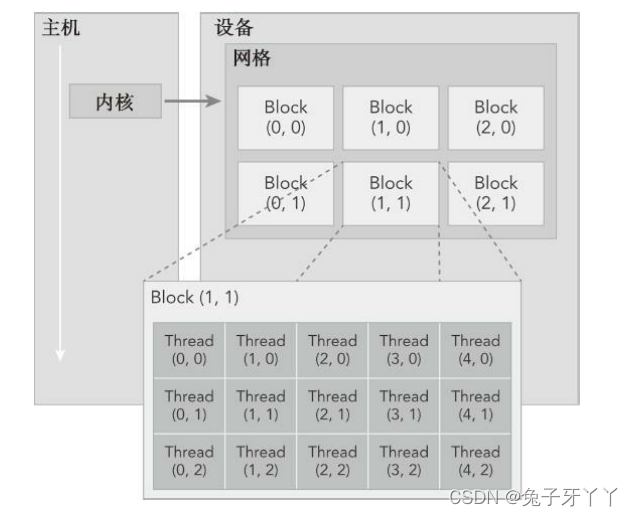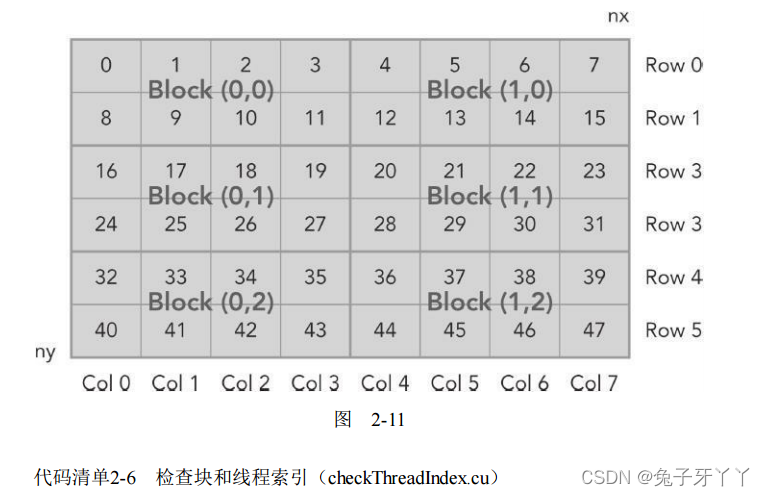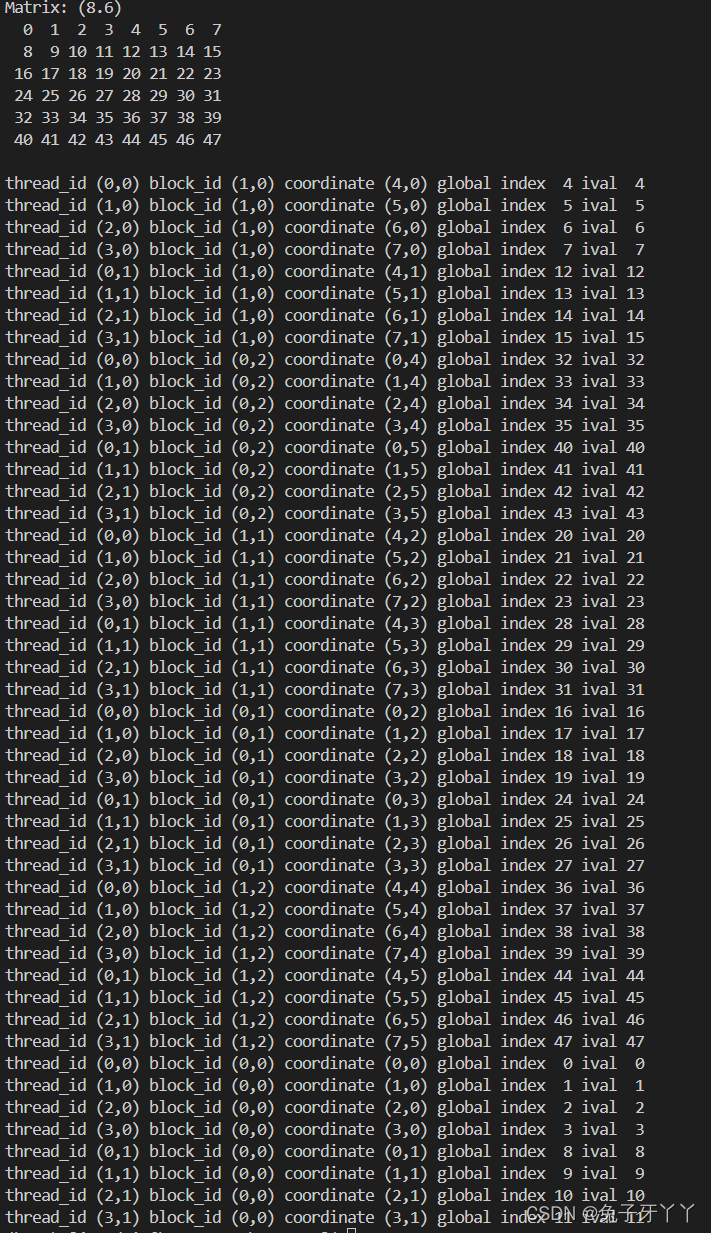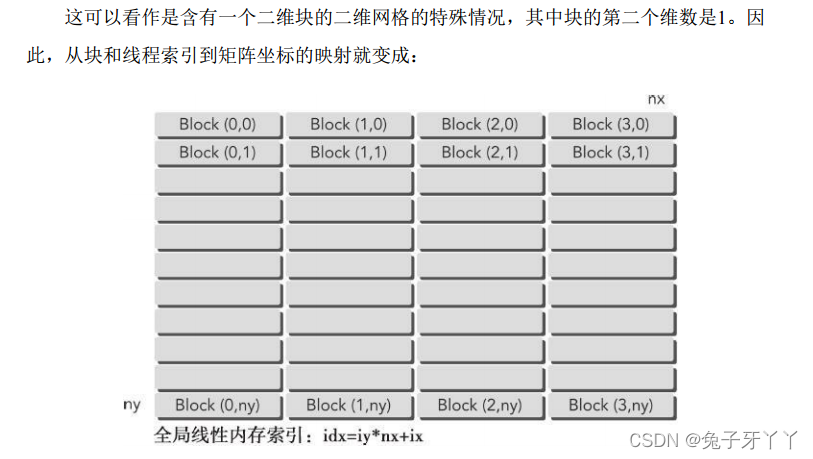CUDA线程模型
2024-01-08 08:55:36
CUDA线程模型
当核函数在主机端启动时,它的执行会移动到设备上,此时设备中会产生大量的线程
并且每个线程都执行由核函数指定的语句。了解如何组织线程是CUDA编程的一个关键部
分。CUDA明确了线程层次抽象的概念以便于你组织线程。这是一个两层的线程层次结
构,由线程块和线程块网格构成,如图2-5所示。

CUDA可以组织三维的网格和块。
图2-5展示了一个线程层次结构的示例,其结构是
一个包含二维块的二维网格。网格和块的维度由下列两个内置变量指定。
·blockDim(线程块的维度,用每个线程块中的线程数来表示)
·gridDim(线程格的维度,用每个线程格中的线程数来表示)
它们是dim3类型的变量,是基于uint3定义的整数型向量,用来表示维度。当定义一个
dim3类型的变量时,所有未指定的元素都被初始化为1。dim3类型变量中的每个组件可以
通过它的x、y、z字段获得。如下所示。
维度
gridDim.x, gridDim.y, gridDim.z,
blockDim.x, blockDim.y, blockDim.z
索引
blockIdx.x, blockIdx.y, blockIdx.z
threadIdx.x, threadIdx.y, threadIdx.z
checkDimension.cu
#include "../common/common.h"
#include <cuda_runtime.h>
#include <stdio.h>
/*
* Display the dimensionality of a thread block and grid from the host and
* device.
*/
__global__ void checkIndex()
{
printf( "gridDim:(%d, %d, %d) blockDim:(%d, %d, %d) threadIdx:(%d, %d, %d) blockIdx:(%d, %d, %d)\n", gridDim.x, gridDim.y, gridDim.z, blockDim.x, blockDim.y, blockDim.z, threadIdx.x, threadIdx.y, threadIdx.z, blockIdx.x, blockIdx.y, blockIdx.z);
// printf("threadIdx:(%d, %d, %d)\n", threadIdx.x, threadIdx.y, threadIdx.z);
// printf("blockIdx:(%d, %d, %d)\n", blockIdx.x, blockIdx.y, blockIdx.z);
// printf("blockDim:(%d, %d, %d)\n", blockDim.x, blockDim.y, blockDim.z);
// printf("gridDim:(%d, %d, %d)\n", gridDim.x, gridDim.y, gridDim.z);
}
int main(int argc, char **argv)
{
// define total data element
int nElem = 6;
// define grid and block structure
dim3 block(3);
dim3 grid((nElem + block.x - 1) / block.x);
// check grid and block dimension from host side
printf("grid.x %d grid.y %d grid.z %d\n", grid.x, grid.y, grid.z);
printf("block.x %d block.y %d block.z %d\n", block.x, block.y, block.z);
// check grid and block dimension from device side
checkIndex<<<grid, block>>>();
// reset device before you leave
CHECK(cudaDeviceReset());
return(0);
}
定义两个block,每个block3个线程
内存管理
由一个内核启动所产生的所有线程统称为一个网格。同一网格中的所有线程共享相同
的全局内存空间。一个网格由多个线程块构成,一个线程块包含一组线程,同一线程块内
的线程协作可以通过以下方式来实现。

使用块和线程建立矩阵索引

二维索引和映射



块和线程索引

checkThreadIndex.cu
#include "../common/common.h"
#include <cuda_runtime.h>
#include <stdio.h>
/*使用块和线程建立矩阵索引
* This example helps to visualize the relationship between thread/block IDs and
* offsets into data. For each CUDA thread, this example displays the
* intra-block thread ID, the inter-block block ID, the global coordinate of a
* thread, the calculated offset into input data, and the input data at that
* offset.
*/
void printMatrix(int *C, const int nx, const int ny)
{
int *ic = C;
printf("\nMatrix: (%d.%d)\n", nx, ny);
for (int iy = 0; iy < ny; iy++)
{
for (int ix = 0; ix < nx; ix++)
{
printf("%3d", ic[ix]);
}
ic += nx;
printf("\n");
}
printf("\n");
return;
}
__global__ void printThreadIndex(int *A, const int nx, const int ny)
{
int ix = threadIdx.x + blockIdx.x * blockDim.x;
int iy = threadIdx.y + blockIdx.y * blockDim.y;
unsigned int idx = iy * nx + ix;
printf("thread_id (%d,%d) block_id (%d,%d) coordinate (%d,%d) global index"
" %2d ival %2d\n", threadIdx.x, threadIdx.y, blockIdx.x, blockIdx.y,
ix, iy, idx, A[idx]);
}
int main(int argc, char **argv)
{
printf("%s Starting...\n", argv[0]);
// get device information
int dev = 0;
cudaDeviceProp deviceProp;
CHECK(cudaGetDeviceProperties(&deviceProp, dev));
printf("Using Device %d: %s\n", dev, deviceProp.name);
CHECK(cudaSetDevice(dev));
// set matrix dimension
int nx = 8;
int ny = 6;
int nxy = nx * ny;
int nBytes = nxy * sizeof(float);
// malloc host memory
int *h_A;
h_A = (int *)malloc(nBytes);
// iniitialize host matrix with integer
for (int i = 0; i < nxy; i++)
{
h_A[i] = i;
}
printMatrix(h_A, nx, ny);
// malloc device memory
int *d_MatA;
CHECK(cudaMalloc((void **)&d_MatA, nBytes));
// transfer data from host to device
CHECK(cudaMemcpy(d_MatA, h_A, nBytes, cudaMemcpyHostToDevice));
// set up execution configuration
dim3 block(4, 2);
dim3 grid((nx + block.x - 1) / block.x, (ny + block.y - 1) / block.y);
// invoke the kernel
printThreadIndex<<<grid, block>>>(d_MatA, nx, ny);
CHECK(cudaGetLastError());
// free host and devide memory
CHECK(cudaFree(d_MatA));
free(h_A);
// reset device
CHECK(cudaDeviceReset());
return (0);
}
矩阵和block,thread三者之间的关系

sumMatrixOnGPU-1D-grid-1D-block.cu

#include "../common/common.h"
#include <cuda_runtime.h>
#include <stdio.h>
/*
* This example demonstrates a simple vector sum on the GPU and on the host.
* sumArraysOnGPU splits the work of the vector sum across CUDA threads on the
* GPU. A 1D thread block and 1D grid are used. sumArraysOnHost sequentially
* iterates through vector elements on the host.
*/
void initialData(float *ip, const int size)
{
int i;
for(i = 0; i < size; i++)
{
ip[i] = (float)(rand() & 0xFF ) / 10.0f;
}
return;
}
void sumMatrixOnHost(float *A, float *B, float *C, const int nx,
const int ny)
{
float *ia = A;
float *ib = B;
float *ic = C;
for (int iy = 0; iy < ny; iy++)
{
for (int ix = 0; ix < nx; ix++)
{
ic[ix] = ia[ix] + ib[ix];
}
ia += nx;
ib += nx;
ic += nx;
}
return;
}
void checkResult(float *hostRef, float *gpuRef, const int N)
{
double epsilon = 1.0E-8;
bool match = 1;
for (int i = 0; i < N; i++)
{
if (abs(hostRef[i] - gpuRef[i]) > epsilon)
{
match = 0;
printf("host %f gpu %f\n", hostRef[i], gpuRef[i]);
break;
}
}
if (match)
printf("Arrays match.\n\n");
else
printf("Arrays do not match.\n\n");
}
// grid 1D block 1D
__global__ void sumMatrixOnGPU1D(float *MatA, float *MatB, float *MatC, int nx,
int ny)
{
unsigned int ix = threadIdx.x + blockIdx.x * blockDim.x; //blockDim=32
if (ix < nx ) //根据nx计算线程id边界
for (int iy = 0; iy < ny; iy++)//每个thread计算每一列的值
{
int idx = iy * nx + ix;
MatC[idx] = MatA[idx] + MatB[idx];
}
}
int main(int argc, char **argv)
{
printf("%s Starting...\n", argv[0]);
// set up device
int dev = 0;
cudaDeviceProp deviceProp;
CHECK(cudaGetDeviceProperties(&deviceProp, dev));
printf("Using Device %d: %s\n", dev, deviceProp.name);
CHECK(cudaSetDevice(dev));
// set up data size of matrix
int nx = 1 << 14;
int ny = 1 << 14;
int nxy = nx * ny;
int nBytes = nxy * sizeof(float);
printf("Matrix size: nx %d ny %d\n", nx, ny);
// malloc host memory
float *h_A, *h_B, *hostRef, *gpuRef;
h_A = (float *)malloc(nBytes);
h_B = (float *)malloc(nBytes);
hostRef = (float *)malloc(nBytes);
gpuRef = (float *)malloc(nBytes);
// initialize data at host side
double iStart = seconds();
initialData(h_A, nxy);
initialData(h_B, nxy);
double iElaps = seconds() - iStart;
printf("initialize matrix elapsed %f sec\n", iElaps);
memset(hostRef, 0, nBytes);
memset(gpuRef, 0, nBytes);
// add matrix at host side for result checks
iStart = seconds();
sumMatrixOnHost(h_A, h_B, hostRef, nx, ny);
iElaps = seconds() - iStart;
printf("sumMatrixOnHost elapsed %f sec\n", iElaps);
// malloc device global memory
float *d_MatA, *d_MatB, *d_MatC;
CHECK(cudaMalloc((void **)&d_MatA, nBytes));
CHECK(cudaMalloc((void **)&d_MatB, nBytes));
CHECK(cudaMalloc((void **)&d_MatC, nBytes));
// transfer data from host to device
CHECK(cudaMemcpy(d_MatA, h_A, nBytes, cudaMemcpyHostToDevice));
CHECK(cudaMemcpy(d_MatB, h_B, nBytes, cudaMemcpyHostToDevice));
// invoke kernel at host side
int dimx = 128;
dim3 block(dimx, 1);
dim3 grid((nx + block.x - 1) / block.x, 1);
iStart = seconds();
sumMatrixOnGPU1D<<<grid, block>>>(d_MatA, d_MatB, d_MatC, nx, ny);
CHECK(cudaDeviceSynchronize());
iElaps = seconds() - iStart;
printf("sumMatrixOnGPU1D <<<(%d,%d), (%d,%d)>>> elapsed %f sec\n", grid.x,
grid.y,
block.x, block.y, iElaps);
// check kernel error
CHECK(cudaGetLastError());
// copy kernel result back to host side
CHECK(cudaMemcpy(gpuRef, d_MatC, nBytes, cudaMemcpyDeviceToHost));
// check device results
checkResult(hostRef, gpuRef, nxy);
// free device global memory
CHECK(cudaFree(d_MatA));
CHECK(cudaFree(d_MatB));
CHECK(cudaFree(d_MatC));
// free host memory
free(h_A);
free(h_B);
free(hostRef);
free(gpuRef);
// reset device
CHECK(cudaDeviceReset());
return (0);
}

sumMatrixOnGPU-2D-grid-2D-block.cu

#include "../common/common.h"
#include <cuda_runtime.h>
#include <stdio.h>
/*使用二维网格和二维块对矩阵求和
* This example demonstrates a simple vector sum on the GPU and on the host.
* sumArraysOnGPU splits the work of the vector sum across CUDA threads on the
* GPU. A 2D thread block and 2D grid are used. sumArraysOnHost sequentially
* iterates through vector elements on the host.
*/
void initialData(float *ip, const int size)
{
int i;
for(i = 0; i < size; i++)
{
ip[i] = (float)(rand() & 0xFF) / 10.0f;
}
return;
}
void sumMatrixOnHost(float *A, float *B, float *C, const int nx,
const int ny)
{
float *ia = A;
float *ib = B;
float *ic = C;
for (int iy = 0; iy < ny; iy++)
{
for (int ix = 0; ix < nx; ix++)
{
ic[ix] = ia[ix] + ib[ix];
}
ia += nx;
ib += nx;
ic += nx;
}
return;
}
void checkResult(float *hostRef, float *gpuRef, const int N)
{
double epsilon = 1.0E-8;
bool match = 1;
for (int i = 0; i < N; i++)
{
if (abs(hostRef[i] - gpuRef[i]) > epsilon)
{
match = 0;
printf("host %f gpu %f\n", hostRef[i], gpuRef[i]);
break;
}
}
if (match)
printf("Arrays match.\n\n");
else
printf("Arrays do not match.\n\n");
}
// grid 2D block 2D
__global__ void sumMatrixOnGPU2D(float *MatA, float *MatB, float *MatC, int nx,
int ny)
{
unsigned int ix = threadIdx.x + blockIdx.x * blockDim.x;
unsigned int iy = threadIdx.y + blockIdx.y * blockDim.y;
unsigned int idx = iy * nx + ix;
if (ix < nx && iy < ny)
MatC[idx] = MatA[idx] + MatB[idx];
}
int main(int argc, char **argv)
{
printf("%s Starting...\n", argv[0]);
// set up device
int dev = 0;
cudaDeviceProp deviceProp;
CHECK(cudaGetDeviceProperties(&deviceProp, dev));
printf("Using Device %d: %s\n", dev, deviceProp.name);
CHECK(cudaSetDevice(dev));
// set up data size of matrix
int nx = 1 << 14;
int ny = 1 << 14;
int nxy = nx * ny;
int nBytes = nxy * sizeof(float);
printf("Matrix size: nx %d ny %d\n", nx, ny);
// malloc host memory
float *h_A, *h_B, *hostRef, *gpuRef;
h_A = (float *)malloc(nBytes);
h_B = (float *)malloc(nBytes);
hostRef = (float *)malloc(nBytes);
gpuRef = (float *)malloc(nBytes);
// initialize data at host side
double iStart = seconds();
initialData(h_A, nxy);
initialData(h_B, nxy);
double iElaps = seconds() - iStart;
printf("Matrix initialization elapsed %f sec\n", iElaps);
memset(hostRef, 0, nBytes);
memset(gpuRef, 0, nBytes);
// add matrix at host side for result checks
iStart = seconds();
sumMatrixOnHost(h_A, h_B, hostRef, nx, ny);
iElaps = seconds() - iStart;
printf("sumMatrixOnHost elapsed %f sec\n", iElaps);
// malloc device global memory
float *d_MatA, *d_MatB, *d_MatC;
CHECK(cudaMalloc((void **)&d_MatA, nBytes));
CHECK(cudaMalloc((void **)&d_MatB, nBytes));
CHECK(cudaMalloc((void **)&d_MatC, nBytes));
// transfer data from host to device
CHECK(cudaMemcpy(d_MatA, h_A, nBytes, cudaMemcpyHostToDevice));
CHECK(cudaMemcpy(d_MatB, h_B, nBytes, cudaMemcpyHostToDevice));
// invoke kernel at host side
int dimx = 32;
int dimy = 16;
dim3 block(dimx, dimy);
dim3 grid((nx + block.x - 1) / block.x, (ny + block.y - 1) / block.y);
iStart = seconds();
sumMatrixOnGPU2D<<<grid, block>>>(d_MatA, d_MatB, d_MatC, nx, ny);
CHECK(cudaDeviceSynchronize());
iElaps = seconds() - iStart;
printf("sumMatrixOnGPU2D <<<(%d,%d), (%d,%d)>>> elapsed %f sec\n", grid.x,
grid.y,
block.x, block.y, iElaps);
// check kernel error
CHECK(cudaGetLastError());
// copy kernel result back to host side
CHECK(cudaMemcpy(gpuRef, d_MatC, nBytes, cudaMemcpyDeviceToHost));
// check device results
checkResult(hostRef, gpuRef, nxy);
// free device global memory
CHECK(cudaFree(d_MatA));
CHECK(cudaFree(d_MatB));
CHECK(cudaFree(d_MatC));
// free host memory
free(h_A);
free(h_B);
free(hostRef);
free(gpuRef);
// reset device
CHECK(cudaDeviceReset());
return (0);
}

sumMatrixOnGPU-2D-grid-1D-block.cu

#include "../common/common.h"
#include <cuda_runtime.h>
#include <stdio.h>
/*
* This example demonstrates a simple vector sum on the GPU and on the host.
* sumArraysOnGPU splits the work of the vector sum across CUDA threads on the
* GPU. A 1D thread block and 2D grid are used. sumArraysOnHost sequentially
* iterates through vector elements on the host.
*/
void initialData(float *ip, const int size)
{
int i;
for(i = 0; i < size; i++)
{
ip[i] = (float)(rand() & 0xFF) / 10.0f;
}
return;
}
void sumMatrixOnHost(float *A, float *B, float *C, const int nx,
const int ny)
{
float *ia = A;
float *ib = B;
float *ic = C;
for (int iy = 0; iy < ny; iy++)
{
for (int ix = 0; ix < nx; ix++)
{
ic[ix] = ia[ix] + ib[ix];
}
ia += nx;
ib += nx;
ic += nx;
}
return;
}
void checkResult(float *hostRef, float *gpuRef, const int N)
{
double epsilon = 1.0E-8;
bool match = 1;
for (int i = 0; i < N; i++)
{
if (abs(hostRef[i] - gpuRef[i]) > epsilon)
{
match = 0;
printf("host %f gpu %f\n", hostRef[i], gpuRef[i]);
break;
}
}
if (match)
printf("Arrays match.\n\n");
else
printf("Arrays do not match.\n\n");
}
// grid 2D block 1D
__global__ void sumMatrixOnGPUMix(float *MatA, float *MatB, float *MatC, int nx,
int ny)
{
unsigned int ix = threadIdx.x + blockIdx.x * blockDim.x;
unsigned int iy = blockIdx.y;
unsigned int idx = iy * nx + ix;
if (ix < nx && iy < ny)
MatC[idx] = MatA[idx] + MatB[idx];
}
int main(int argc, char **argv)
{
printf("%s Starting...\n", argv[0]);
// set up device
int dev = 0;
cudaDeviceProp deviceProp;
CHECK(cudaGetDeviceProperties(&deviceProp, dev));
printf("Using Device %d: %s\n", dev, deviceProp.name);
CHECK(cudaSetDevice(dev));
// set up data size of matrix
int nx = 1 << 14;
int ny = 1 << 14;
int nxy = nx * ny;
int nBytes = nxy * sizeof(float);
printf("Matrix size: nx %d ny %d\n", nx, ny);
// malloc host memory
float *h_A, *h_B, *hostRef, *gpuRef;
h_A = (float *)malloc(nBytes);
h_B = (float *)malloc(nBytes);
hostRef = (float *)malloc(nBytes);
gpuRef = (float *)malloc(nBytes);
// initialize data at host side
double iStart = seconds();
initialData(h_A, nxy);
initialData(h_B, nxy);
double iElaps = seconds() - iStart;
printf("Matrix initialization elapsed %f sec\n", iElaps);
memset(hostRef, 0, nBytes);
memset(gpuRef, 0, nBytes);
// add matrix at host side for result checks
iStart = seconds();
sumMatrixOnHost(h_A, h_B, hostRef, nx, ny);
iElaps = seconds() - iStart;
printf("sumMatrixOnHost elapsed %f sec\n", iElaps);
// malloc device global memory
float *d_MatA, *d_MatB, *d_MatC;
CHECK(cudaMalloc((void **)&d_MatA, nBytes));
CHECK(cudaMalloc((void **)&d_MatB, nBytes));
CHECK(cudaMalloc((void **)&d_MatC, nBytes));
// transfer data from host to device
CHECK(cudaMemcpy(d_MatA, h_A, nBytes, cudaMemcpyHostToDevice));
CHECK(cudaMemcpy(d_MatB, h_B, nBytes, cudaMemcpyHostToDevice));
// invoke kernel at host side
int dimx = 32;
dim3 block(dimx, 1);
dim3 grid((nx + block.x - 1) / block.x, ny);
iStart = seconds();
sumMatrixOnGPUMix<<<grid, block>>>(d_MatA, d_MatB, d_MatC, nx, ny);
CHECK(cudaDeviceSynchronize());
iElaps = seconds() - iStart;
printf("sumMatrixOnGPU2D <<<(%d,%d), (%d,%d)>>> elapsed %f sec\n", grid.x,
grid.y,
block.x, block.y, iElaps);
// check kernel error
CHECK(cudaGetLastError());
// copy kernel result back to host side
CHECK(cudaMemcpy(gpuRef, d_MatC, nBytes, cudaMemcpyDeviceToHost));
// check device results
checkResult(hostRef, gpuRef, nxy);
// free device global memory
CHECK(cudaFree(d_MatA));
CHECK(cudaFree(d_MatB));
CHECK(cudaFree(d_MatC));
// free host memory
free(h_A);
free(h_B);
free(hostRef);
free(gpuRef);
// reset device
CHECK(cudaDeviceReset());
return (0);
}

文章来源:https://blog.csdn.net/qq_43570025/article/details/135374717
本文来自互联网用户投稿,该文观点仅代表作者本人,不代表本站立场。本站仅提供信息存储空间服务,不拥有所有权,不承担相关法律责任。 如若内容造成侵权/违法违规/事实不符,请联系我的编程经验分享网邮箱:veading@qq.com进行投诉反馈,一经查实,立即删除!
本文来自互联网用户投稿,该文观点仅代表作者本人,不代表本站立场。本站仅提供信息存储空间服务,不拥有所有权,不承担相关法律责任。 如若内容造成侵权/违法违规/事实不符,请联系我的编程经验分享网邮箱:veading@qq.com进行投诉反馈,一经查实,立即删除!
